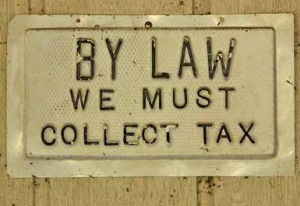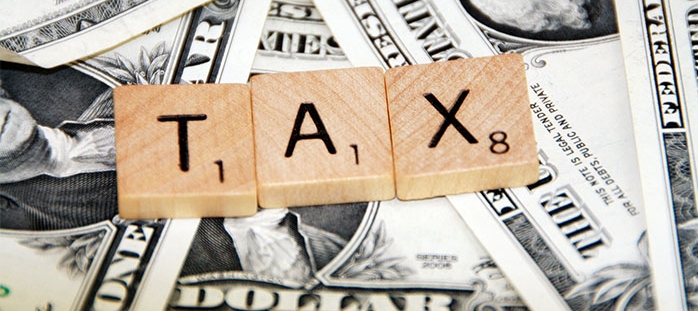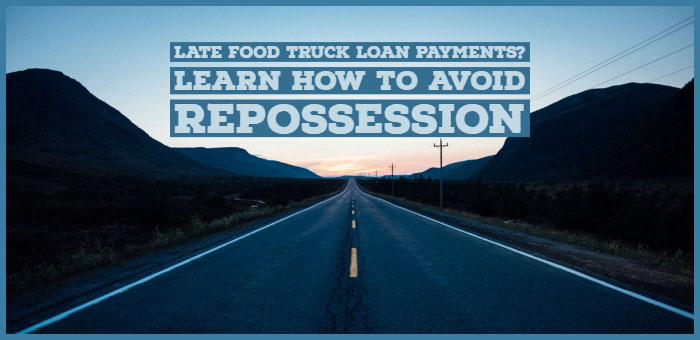Today, I’ll cover some basic information on food truck taxes and common write-offs in this industry. Keep in mind, I’m writing these from the perspective of a veteran food truck owner and not an accountant. I suggest working with a professional to submit taxes accurately and to take a project off your plate. With that disclaimer out of the way, here are my thoughts on the basics of food truck taxes.
Page Contents
Business Structure and Taxes
Your taxed differently on a food truck, depending on how you structure the business. Here are the most common business structures for food truck vendors I’ve met.
Sole proprietorships
If you’re a sole proprietor, every year you must file Schedule C with your Form 1040 to report your business’s net profit and loss. You also must file Schedule SE with your 1040. If you’re a calendar-year taxpayer, your tax filing date is April 15. Fiscal-year taxpayers must file their returns no later than the 15th day of the fourth month after the end of their tax year.
You must also make estimated tax payments if you expect to owe at least $1,000 in federal tax. This comes after subtracting your withholding and credits, and if your withholding will be less than the smaller of 90 percent of the tax to be shown on your current year tax return or 100 percent of your previous year’s tax liability.
Partnerships
A food truck partnership is a business arrangement where two or more individuals agree to operate a food truck business together, sharing profits, losses, responsibilities, and decision-making.
In many cases, food truck partnerships are formed between spouses, making husband and wife teams quite common in the industry. These partnerships often capitalize on the unique strengths and skills of each partner. For example, one spouse might handle the culinary aspects of the business, such as menu planning and cooking, while the other takes care of the business side, including marketing, customer service, and financial management.
Partners in a food truck business are considered self-employed. This means they are responsible for paying self-employment taxes, which cover Social Security and Medicare taxes. Unlike employees who share these costs with their employers, partners must pay the full amount themselves, which can be a significant financial burden. Additionally, each partner must receive a Schedule K-1 form, which shows their share of the partnership’s income or loss.

Is this a food truck license?
Limited Liability Companies (LLCs)
This is probably the most popular business structure for veteran food truck owners. For a food truck owner, forming an LLC can be a smart move. It gives you the flexibility of running your business smoothly while offering a layer of protection you wouldn’t have if you were just operating on your own.
Now, let’s talk about taxes. One of the neat things about an LLC is that it’s like a chameleon for tax purposes—it can adapt to what works best for you. Usually, an LLC is what’s called a “pass-through” entity, meaning the business itself doesn’t pay taxes directly. Instead, any money the business makes passes through to you, the owner, and you report it on your personal tax return. This setup can keep things simple and potentially save you money on taxes.
However, if it turns out to be better for you tax-wise, your LLC can choose to be taxed like a corporation. This could be helpful in certain situations, like if your food truck business starts making a lot of money. You might find that corporate taxes are lower for you, or you might want to keep some money in the business to help it grow.
In short, an LLC gives a food truck owner both protection and flexibility, acting as a safety net for personal assets and offering options for how to handle taxes in a way that best suits their financial situation. My personal tax preparer has always suggested being taxed as an S-Corp so that’s what I go with.
Tax Deductible Expenses / Write Offs
Food truck businesses, like other small businesses, are eligible for a variety of tax deductions that can significantly reduce their taxable income. Understanding these deductions is crucial for maximizing profits and in a lot of cases will be needed to operate at a profit.
According to the IRS, the operating costs of running your food truck business are deductible if they’re ordinary and necessary. The IRS has their own definitions of “ordinary and necessary” so make sure you study them before defining them yourself.
Equipment purchases: Food truck owners can fully deduct from taxable income a limited amount of the cost of new business equipment in a year rather than depreciating the cost over several years. Need a new grill or range for your food truck kitchen, get it, but write it off.
Permits and Licenses: Costs associated with obtaining the necessary permits and licenses to operate a food truck are deductible. This can include local health department permits, parking permits, and business licenses.
Commissary Fees: Many food trucks operate out of a commissary kitchen, which provides space for food preparation and storage. Fees paid to these facilities are deductible as a business expense.
Business expenses: Some common food truck tax expenses you can take a deduction include advertising expenses, employee benefit programs, insurance, legal and professional services, telephone and utilities costs, rent, office supplies, employee wages and membership dues to industry associations.
Vehicle expenses: Since you use a vehicle for your mobile food business, the IRS allows you to either deduct your actual food truck tax related expenses or claim the standard mileage rate. This is a specified amount of money you can deduct for each business mile you drive. For food truck tax purposes, be sure to keep a log of the miles you put on your truck, as well as the costs of parking fees and tolls, because you can deduct these expenses.

This is a great book to get an overview of food truck tax write offs.
Employee Salaries and Benefits: Wages, salaries, and benefits (like health insurance) for employees are fully deductible business expenses. However, payments to the business owners themselves (if the business is structured as a corporation) are treated differently for tax purposes.
Rent or Lease Payments: If you rent or lease equipment (like kitchen equipment or the food truck itself, if not owned), those payments are deductible. On more than one occasion I’ve rented a tent for special events. This is one of the items I wrote off.
Travel expenses: While most food truck vendors stay in their local area most of the year, you can deduct ordinary and necessary expenses you incur while traveling for your food truck business. Your records need show the amount of each expense for items such as transportation, meals and lodging.
Be sure to record the date of departure and return for each trip. Also include the number of days you spent on business, the name of the city, and the business reason for the travel or the business benefits you expect to achieve (trade show, conference, meeting new suppliers).
Mileage Deduction: For 2023, the standard mileage rate for business use of a vehicle is 65.5 cents per mile (note: rates may change annually). This method requires less detailed record-keeping than the actual expense method, but you still need to keep a log of the miles driven for business purposes. I use QuickBooks to record my mileage and it works pretty well since you can record it on the app while you’re on the move.
Pro Tip: Keep Your Receipts
Hopefully, you’ve collected all of the receipts related to your businesses expenses. Any expense for which you can provide a receipt if requested you can comfortably deduct, but if you lack a receipt, think twice about whether the deduction is worthwhile.
Small costs unsupported by a receipt can turn into a huge headache if the IRS decides to audit you and your return. Take a walk around your office to identify possible deductions. Miles driven on personal vehicles when doing business related driving, the mileage your drive your truck throughout the year, computer equipment and other expenses are deductible.
As a mobile food vendor, one of your many responsibilities will be the correct payment of food truck sales tax. Even though the consumer is usually responsible for paying the tax, the vendor has the obligation to collect as the seller and submit it to the government. More on this below.
Your suppliers do not (or shouldn’t) charge you sales tax on food used exclusively for resale so sales taxes will only be due when you eventually sell food to your food truck customers. Most new food truck owners aren’t familiar with food truck sales tax. Because of this, we thought we’d share some of the basics.
Sales Tax Basics

Help Uncle Sam by Collecting Taxes!
One nice thing about collecting sales that is that all modern point-of-sale (POS) systems will help you do this. Platforms like Square or Clover will automatically calculate state taxes and charge customers appropriately so you don’t need to manually determine this yourself.
Sales Taxes
A sales tax is charged on the sale of services including the sale of most food from a food truck. The sales tax is calculated by multiplying the sale price by the current state sales tax rate. Forty-five states, plus the District of Columbia impose a sales tax on retail sales of certain services which include food truck meals. Sales tax rates vary from state to state. Municipalities can also charge a sales tax that will be added to your purchase price on top of the state sales tax.
Sales Tax On Food For Resale
Purchasing food for a food truck that is used exclusively for resale is exempt from sales taxes at the time of purchase. This relates to trucks that offer chips or desserts that are sold from your truck but not made by you. Depending on your state, you may be required to present your supplier resale certificate to prove you will be purchasing the food for the sole purpose of resale.
Collecting Food Truck Sales Tax
When you sell food to your customers, you are responsible for collecting sales taxes. You do not pay taxes on the purchase of food because you will be collecting taxes on the final product that leaves your service window. It is your responsibility to correctly calculate the amount of sales taxes due by your customers. You must register your food truck with your state and make payments of sales taxes at least quarterly. If you do not make the required sales tax payments to your state, your food truck business is likely to be charged a hefty penalty based on the estimated unpaid taxes.
Sales Tax Rules of Thumb
- Know your state tax laws. Many states have state and local sales tax rates. This means that the going sales tax rate can change depending on what city your sales come from.
- Never over collect. A common question we hear is, “in states with variable local taxes, can I just pick an average tax rate?” The simple answer is No! First, consumers don’t like this and second, collecting at a higher rate is huge mistake. If you find that you did over collect, you will need to remit that amount to the state as an over collection, or refund the overage to the consumer.
- Stay Up To Date. Once you’ve successfully registered for a license to collect and pay sales taxes, you’ll start getting correspondence from the state. It is always a good idea to read through the notices that they send you. These notices will alert you of any changes in your account, rate updates, etc.
I hope this article has helped you better understand food truck sales tax. Vendors need to know how to tax the food you sell from your truck. To get a better understanding we always suggest speaking with an accountant familiar with the food service industry.
If you aren’t comfortable with doing your taxes yourself, make sure to hire an accountant familiar with taxes for food service, restaurant, and food truck businesses. I choose to hire out this work due to the complexity of tax changes that seem to come with every passing year.




